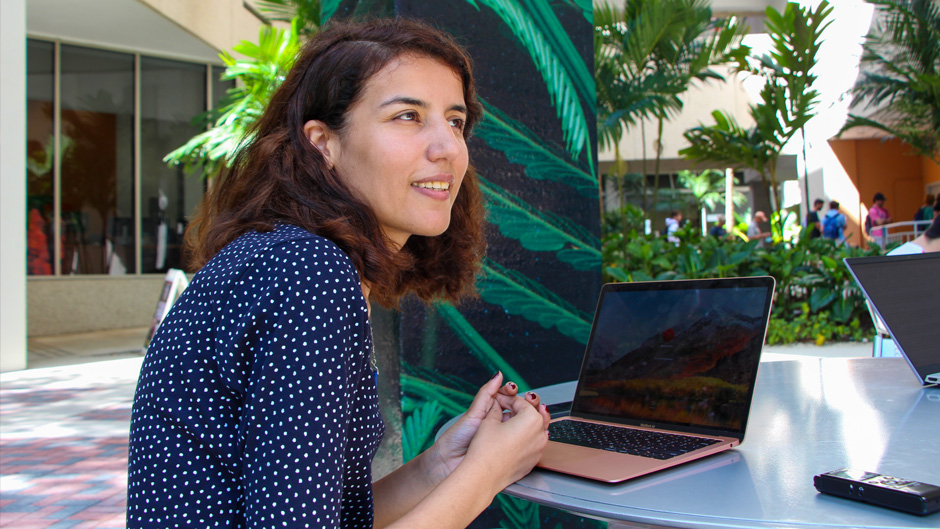Since toppling the U.S.-backed government in Afghanistan in late August of 2021 and seizing power, the Taliban government imposed a series of measures—as many feared they would—that restricted freedoms and worsened already dire conditions. Among the most draconian, announced last December, was to ban most women from education beyond the sixth grade.
Zakera Azizi, who graduated with a master’s degree in international business last fall, knows and appreciates more than most the power that education offers. A former Afghani official in her role as an advocate for women’s rights, Azizi was transported out of Kabul on a U.S. military plane when the government collapsed as part of a months-long odyssey that brought her to Miami to study.
A University of Miami Patti and Allan Herbert Business School scholarship provided by Global Crossing Airlines, for qualifying Afghani students, paved the way to her University degree.
Now an alumna, Azizi’s passion to support women in Afghanistan has not lessened in the least. In January, in partnership with Global Co Lab Network, an international organization that empowers teens and young adults around the world, she launched a project that provides weekly English classes to a small group of women in her native country.
“I just knew I needed to start something to help women and girls in Afghanistan,” Azizi said. “School and university and work are all banned for women in Afghanistan. They can’t go outside, they’re almost always at home. We have to give them hope and do something to work on their mental health.”
After graduating, Azizi moved to the Washington, D.C. area to be closer to friends and to seek a job in finance that makes use of her degree. Because of her previous work on U.S. Agency for International Development (USAID) projects in Afghanistan, she was granted a special immigrant visa and is on the verge of securing her green card from U.S. Citizenship and Immigration Services.
In the capital, she met Maryam Rayed, a compatriot who’s in the last semester of her master’s degree at a Washington university. Rayed suggested a collaboration through her work with Global Co Lab Network, which focuses on United Nations Sustainable Development Goals to empower youths and young adults ages 13-35.
Ed Wegel, chairman and CEO of Global Crossing Airlines, and his wife, Susan, are funding the costs of the internet platform needed for Azizi’s project. “We must ensure access to education for Afghani women—to provide them the future opportunities they need to thrive in Afghanistan today,” said Wegel.
“We became aware of Zakera’s passion to help women in Afghanistan through her Miami Herbert scholarship. And when we learned of her commitment to this teaching project, we wholeheartedly pledged our support,” he added.
The platform requires no login or downloads, a critical consideration for the women in Afghanistan who must participate clandestinely and use mobile phones to connect. Phone banks to charge the phones also were provided, because power is sporadic at best.
For now, the project consists of a weekly, 90-minute English language class. An English-language instructor manages the language component, and Azizi and Rayed spend the first half-hour conversing with the current group of 12 or so women, listening to their problems and learning about the situation.
“From the outside, we’re trying to give them hope,” Azizi explained. “We tell them that we grew up under the Taliban [when they were in power 20 years ago], and we didn’t have access to education but managed to get to university. So, don’t give up. Work hard, focus, and imagine what you can do in the future.”
The project, which began in early January soon after the edict to ban education for women, focuses on developing English language proficiency “so they can communicate with the world” and as an avenue to potential online employment. The women, ranging in age from 15-24, essentially are at the same level. A second stage would be to offer a certificate of proficiency and later to offer classes in other subject areas.
The hope is also to “train the trainers,” that each of the women participating in the class becomes proficient enough to teach others.
As much as she longs to return to Afghanistan, Azizi knows that is not an option because of her prior involvement with the government. And while she is well aware of the desperate situation in Afghanistan and how challenging it is—especially for women—she encourages the women to resist the urge to flee.
“Everyone is just thinking to leave the country, but we have to start to change the situation there and change takes time. Soon again, the Taliban will be gone, and the government will change,” she professed.
In the meantime, as she continues her job search, Azizi looks forward to the weekly language class.
“It’s the happiest time of my week to be talking with and helping these women,” she said.
Visit https://teensdreamcolab.org to learn more about the project.

